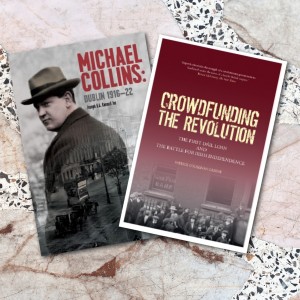The First Dáil Loan and the Battle for Irish Independence.
‘Can you say whether your bank has an account in the name of a man called Michael Collins?’ -
In 1919, the revolutionary Irish government launched an audacious plan to finance a counter-state in open defiance of British rule in Ireland. Half the money was to be raised in Ireland and half in America. This start-up government was determined not only to replace the British administration in Ireland but also to implement its own industrial and financial policies, including establishing a national bank.
It was imperative that the domestic funding campaign succeed. Without funds, the counter-state government would be doomed to failure. A financial ‘Ho Chi Minh Trail’ was established; couriers secretly began distributing three million promotional leaflets throughout the country and carrying subscriptions to Dublin. The money was laundered into bank accounts and converted into gold using a ‘gold exchange network’.
This is the untold history of the fight for the revolutionary government’s funds, the bank inquiry that shook the financial establishment and the first battle in the intelligence war.
Author Bio
Patrick O’Sullivan Greene, from Killarney, Co. Kerry, has been an activist investor for almost twenty years, was an award-winning equity analyst, and a qualified Chartered Accountant. More interested in business than pure finance, he expresses his entrepreneurial spirit through roles as a co-founder, director, mentor, and sometimes investor, in start-up companies. Patrick has worked in Dublin, London, New York and France.
MICHAEL COLLINS: DUBLIN 1916–22
Joseph E.A. Connell Jnr
The story of Michael Collins in Dublin is the story of Irish nationalism and separatism from 1916 until 1922. Collins’s footprint was on every street, laneway and alley of Dublin, but especially of Dublin 1. This is the story of those locations, as well as of the men and women associated with Collins in Ireland’s capital city from the time of the Rising until his untimely death in 1922.
It is unknown whether Collins spent more than a night in Dublin prior to leaving for London to work in the British Post Office in 1906, but his presence there seemed ubiquitous from 1916 to 1922. He is widely remembered today for the significant role he played during the War of Independence of 1919–21. As director of intelligence, president of the IRB and minister for finance, he established several offices and safe houses throughout the city. It was said that he never slept in the same house two nights in a row after going on the run in April 1918 until the Truce in July 1921. Truly, Collins made Dublin his own. He once famously said that ‘Whoever controls Dublin controls Ireland’. He was right.
The streets of Dublin are paved with stories. A good way to build one’s knowledge of Michael Collins is to walk in his footsteps and, in so doing, relive those stories and gain an understanding of this difficult period in Irish history—and, indeed, of this enigmatic yet iconic figure. With this book the reader can do just that.
Published: 20 April 2017.
Joseph E.A. Connell Jnr is the author of Dublin Rising 1916 and Who’s who in the Dublin Rising 1916, published in 2016 by Wordwell. He writes a regular column in History Ireland and is a regular contributor to Newstalk’s Talking History programme.
| Details | |
| Author | Patrick O'Sullivan Greene |
| Publisher | Eastwood Books |
| Format | Paperback |
| Subjects | General Interest |
Crowdfunding the Revolution & MICHAEL COLLINS: DUBLIN 1916–22
- ISBN: 978-1-9161375-8-5
- Author(s): Patrick O'Sullivan Greene
- Availability: In Stock
-
€35.00
Tags: Crowdfunding the Revolution & MICHAEL COLLINS: DUBLIN 1916–22

